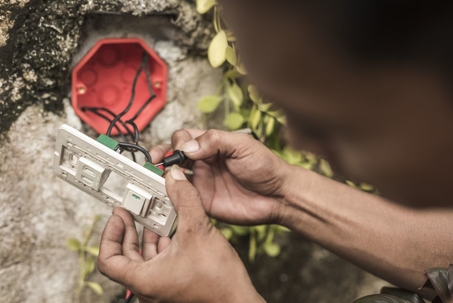What Every San Jose Homeowner Should Know
In the quest to create the perfect outdoor living space, homeowners often think about landscaping, outdoor furniture, and entertainment areas. However, outdoor electrical safety can slip through the planning cracks, leading to potential dangers that can compromise the safety of your family and property.
Understanding common hazards and implementing best practices for outdoor electrical safety are essential for every homeowner planning to enjoy their outdoor spaces this summer.
The Common Dangers of Outdoor Electrical
Outdoor electrical components, fixtures and appliances present unique challenges and dangers. Unlike their indoor counterparts, these components are exposed to weather elements, which can lead to wear and deterioration over time.
Water ingress, for example, is a significant concern, as it can cause short circuits and potentially lead to fire hazards. Additionally, garden equipment such as lawnmowers can accidentally damage outdoor wiring. Meanwhile, overloaded circuits can overheat when powering multiple outdoor appliances.
Best practices for outdoor electrical safety include:
- Keeping outdoor outlets covered and dry.
- Install ground fault circuit interrupters (GFCIs)
- Always take great caution when working with outdoor electrical devices.
- Avoid DIY electrical repairs or installations.
- Have your electrical system regularly inspected by our licensed electricians.
Keep reading to learn more about how you can implement these best practices at your home.
Protecting Your Outlets from Water
Ensuring safety when dealing with outdoor electrical components requires diligence and awareness. Use weatherproof electrical boxes and covers. These are designed to protect your exterior outlets from water, even when they are in use. Similarly, ensure covers are in place when outlets are not in use.
Also, outdoor outlets should be equipped with Ground Fault Circuit Interrupters (GFCIs). GFCIs provide crucial protection against electric shock by monitoring the flow of electricity in a circuit. They instantly shut off power if they detect any imbalance, such as when an electrical current comes into contact with water or a person.
Always Handle Outdoor Electrical Devices Carefully
Proper precautions when using electrical devices outdoors can significantly reduce the risk of accidents. Use outdoor-rated extension cords, which are thicker and more durable than indoor ones and specifically designed to withstand weather conditions and minimize fire risks.
Equally important is keeping all electrical devices and cords away from water. Only operate electrical equipment in wet conditions if it is explicitly certified for such use. Similarly, inspect equipment and components before use - if any look damaged or worn, do not use them.
These simple precautions can prevent electric shocks and other electrical hazards, ensuring a safe environment for you and your loved ones to enjoy the outdoors.
Regular Inspection and Maintenance
Regular inspections and maintenance of outdoor electrical systems by the electricians at Valley Heating, Cooling, Electrical and Solar are crucial to ensuring the safety and efficiency of your home's outdoor spaces. Our professionals can identify and rectify potential electrical hazards you might overlook, ensuring that your outdoor living area remains safe and enjoyable for everyone. In between maintenance visits, remain vigilant for possible problems.
If you notice any of the following signs of a problem, reach out to the team at Valley to schedule a repair visit:
- Flickering or dimming outdoor lights may indicate a faulty electrical connection.
- Tripping circuit breakers or GFCI outlets suggest an overloaded circuit or a fault in the outdoor electrical system.
- Exposed wires or damaged insulation on outdoor wiring pose severe risks of short circuits and electrical shocks.
- Outlets or switches that feel warm to the touch are a potential sign of electrical components struggling to handle the current.
- Rust on outlet covers or electrical boxes can compromise the safety features designed to protect against weather and moisture.
While fixing an electrical problem on your own might be tempting, outdoor electrical repairs can be very hazardous. Without the proper training and equipment, attempting a repair could result in electric shock or further damage to your electrical system.
Instead, if it's safe to do so, turn off the power to the area where the problem is identified. This can help prevent potential accidents until a professional can assess the issue. Then, call the team at Valley for reliable repair service.
Remember, electrical safety is not just a good practice—it's necessary to protect your loved ones and your investment in your home. Contact us online to schedule an appointment with our electricians.

